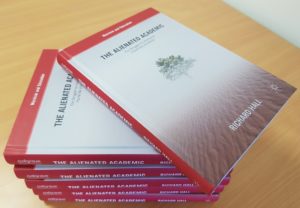Over at the Institute of Education, Tom Woodin is editing a collection to celebrate the 100th anniversary of the Co-operative College. The collection is titled: Learning for a Co-operative World – Education, Social Change and the Co-operative College, and I have morphed my chapter away from higher education, to focus upon the relationship between platforms, cooperation and knowledge production.
Below I give an overview of what I have been focusing upon, with my reference list.
A kind of abstract or structure.
The struggle for knowledge
This struggle over knowledge production, and its commodification both of knowledge and the labour-power that produces that knowledge, is a crucial moment of re-imagination in the face of crisis. I question how this struggle enables individuals and communities to challenge the hegemonic idea of transhistorical, educational institutions, through their claims over knowledge, its production and governance, and the data that flow from it.
The value of co-operative knowledge
Value is fundamental in understanding the production, circulation and consumption of knowledge. Through the capital-relation, the production of knowledge is rooted in oppressive social relations, governed by the need to extract surplus-value in the production process, through an attrition on labour rights or the proletarianisation of that labour. Against the second-order mediation of our engagement with knowledge, enacted through private property, the division of labour and separation of disciplines, and commodity exchange, is it possible to liberate socially-useful knowledge?
The platform against knowledge production
However, this liberation (or the potential for reimagining) situates knowledge against ideas of communal production and solidarity on the global Commons, and forces us into a critique of the relationship between communities and technology, in part mediated through the idea of platforms. This critiques ideas and practices of technology-rich, co-operative knowledge production, in order to discuss whether they enable (only certain?) communities to reconstitute their own lived experiences, or whether Capital’s cybernetic control mechanisms simply reterritorialise these experiences for value, whilst marginalising or making invisible other lived experiences.
The knowledge potential of platform co-operativism
The political economy of the platform is a governance risk for societies where those platforms dominate the economic mediation of society by monopolising its hardware and software. One response to this points towards platform co-operativism, with co-operative principles and values shaping the governance, regulation and funding of the platform, such that knowledge infrastructures are shaped as collective rather than private goods. However, such open practices are often rooted in radical disintermediation of access to the Commons, and this risks ignoring the implications of structural forms of privilege and power, alongside differential knowledge and literacy amongst certain groups. It also risks ignoring how the structure of the Commons might act as a barrier to certain groups, in terms of governing principles, the lived experience of co-operation, sharing access to data, and the open sharing of the full range of knowledge, skills and capabilities.
Another world is possible
At issue is how we find co-operative mechanisms for dissolving knowledge production that has been enclosed inside institutions into the fabric of society, in order to enable communities to widen their own spheres of autonomy. This is important if the co-operative and open development of knowledge through platforms is to challenge intersectional injustice, rather than simply to replicate it. In this way, the development of the realm of autonomy requires that open and platform co-operatives prefigure the world they wish to see.
References
Ahmed, S. (2017). Living a Feminist Life. Durham, NC: Duke University Press.
Amsler, S. (2015). The Education of Radical Democracy. London: Routledge.
Bauwens, M. (2014). Open Cooperativism for the P2P Age. Available at: https://blog.p2pfoundation.net/open-cooperativism-for-the-p2p-age/2014/06/16
Berardi, F. (2009). The Soul at Work: From Alienation to Autonomy. Translated by F. Cadel and G. Mecchia, with preface by J. Smith. Los Angeles: Semiotext(e).
boyd, d. (2017). The Radicalization of Utopian Dreams. Available at: https://points.datasociety.net/the-radicalization-of-utopian-dreams-e1b785a0cb5d
Breidlid, A. (2013). Education, Indigenous Knowledges, and Development in the Global South. London: Routledge.
Canaan, J. (2017). The (Im)possibility of Mass Intellectuality: Viewing Mass Intellectuality Through the Lens of the Brazilian Landless Movement. In Mass Intellectuality and Democratic Leadership in Higher Education, edited by R. Hall and J. Winn, 69-80. London: Bloomsbury Academic.
Ciccariello-Maher, G. (2017). Decolonizing Dialectics. Durham, NC: Duke University Press.
Clarke, S. (1991). Marx, Marginalism and Modern Sociology: From Adam Smith to Max Weber. London: Palgrave.FH
Cleaver, H. (2017). Rupturing the Dialectic: The Struggle against Work, Money, and Financialization. Oakland, CA: AK Press.
de Peuter G., and Dyer-Witheford N. (2010). ‘Commons and Cooperatives’, Affinities: A Journal of Radical Theory, Culture, and Action, 4(1), pp. 30-56.
de Sousa Santos, B. (ed. 2007). Cognitive Justice in a Global World: Prudent Knowledges for a Decent Life. New York, NY: Lexington Books.
Deleuze, G., and Guattari, F. (1983). Anti-Oedipus: Capitalism and Schizophrenia. Minneapolis, MN: University of Minnesota Press.
Deleuze, G., and Guattari, F. (1987). A Thousand Plateaus: Capitalism and Schizophrenia. Minneapolis, MN: University of Minnesota Press..
Dinerstein, A. (2015). The Politics of Autonomy in Latin America: The Art of Organising Hope. London: Palgrave Macmillan.
Dyer-Witheford, N. (2004). ‘1844/2004/2044: The return of species-being’, Historical Materialism, 12(4), pp. 3-25.
Feenbery, A. (1999). Questioning Technology. London: Routledge.
FLOK Society. (n.d.). Available at: http://commonstransition.org/flok-society/
Foucault, M. (1975). Discipline and Punish: The Birth of the Prison. London: Penguin.
Gorz, A. (1982). Farewell to the Working Class: An essay on Post-Industrial Socialism. London: Pluto Press.
Haiven, M. (2014). Crises of Imagination, Crises of Power: Capitalism, Creativity and the Commons. London: Zed Books.
Hall, G. (2016). The Uberfication of the University. Minneapolis, MN: Minnesota University Press.
Hall, R., (2015a). ‘The University and the Secular Crisis’, Open Library of Humanities, 1(1), p.e6. DOI: http://doi.org/10.16995/olh.15
Hall, R. (2015b). ‘For a Political Economy of Massive Open Online Courses’, Learning, Media and Technology, 40(3), pp. 265-86.
Hall, R. (forthcoming). The Alienated Academic: The Struggle for Autonomy Inside the University. London: Palgrave Macmillan.
Hall, R., and Winn, J. (eds 2017). Mass Intellectuality and Democratic Leadership in Higher Education. London: Bloomsbury Academic
hooks, bell. 1994. Teaching to Transgress: Education as the Practice of Freedom. London: Routledge.
Huws, U. (2014). Labor in the Global Digital Economy: The Cybertariat Comes of Age. New York, NY: Monthly Review Press.
ICA. (n.d.). Available at: https://ica.coop/
IOO. (n.d.). Available at: https://ioo.coop/
PCC. (n.d.). Available at: https://platform.coop/about/consortium
Kornberger, M., Pflueger, D., and Mouritsen, J. (2017). ‘Evaluative infrastructures: Accounting for platform organization’, Accounting, Organizations and Society, 60, pp. 79-95. Available at: http://dx.doi.org/10.1016/j.aos.2017.05.002, 1-17.
Lazzarato, M. (2014). Signs and Machines: Capitalism and the Production of Subjectivity. Cambridge, MA: Semiotext(e)/MIT Press.
Lorey, I. (2017). Labour, (in-)dependence, care: Conceptualizing the precarious. In E. Armano, A. Bove and A. Murgia, Mapping Precariousness, Labour Insecurity and Uncertain Livelihoods: Subjectivities and Resistance. London: Routledge, translated by A. Derieg, 199-209.
Marcuse, H. (1998). Technology, War, and Fascism, Collected Papers of Herbert Marcuse, Vol. 1. Ed. D. Kellner. New York: Routledge.
Marx, K. (1866). Instructions for the Delegates of the Provisional General Council: The Different Questions. Available at: http://www.marxists.org/archive/marx/works/1866/08/instructions.htm
Marx, K. (1970). Critique of the Gotha Programme. In Marx and Engels Selected Works, Volume Three, 13-30. Moscow: Progress Publishers.
Marx, K. (1974). Economic and Philosophical Manuscripts. Moscow: Progress Publishers.
Marx, K. (1991). Capital, Volume 3: A Critique of Political Economy. London: Penguin.
Marx, K. (2004). Capital, Volume 1: A Critique of Political Economy. London: Penguin.
Marx, K. (2008). Wage-Labour and Capital. Cabin John, MD: Wildside Press.
Marx, K., and Engels, F. (1998). The German Ideology: including Theses on Feuerbach and Introduction to the Critique of Political Economy. New York: Prometheus.
McGettigan, A. (2015). The Treasury View of HE: Variable Human Capital Investment. Political Economy Research Centre Papers Series 6. Available at: http://www.perc.org.uk/perc/wp-content/uploads/2015/04/PERC-6-McGettigan-and-HE-and-Human-Capital-FINAL-1.pdf
McMillam Cottom, T. (2016). Lower Ed: The Troubling Rise of For-Profit Colleges in the New Economy. New York: The New Press.
Mészáros, I. (2005). Marx’s Theory of Alienation. London: Merlin Press.
The Midnight Collective. (2008). ‘The New Enclosures’. In Subverting the Present Imagining the Future: Insurrection, Movement, Commons, ed. Bonefeld, W. New York, NY: Autonomedia, pp. 13-26.
Miller Medina, J. E. (2005). The State Machine: politics, ideology, and computation in Chile, 1964-1973. Unpublished Ph.D. thesis, MIT. http://dspace.mit.edu/handle/1721.1/39176
Neary, M. (2011). ‘Student as Producer: A Pedagogy for the Avant-Garde; Or, How Do Revolutionary Teachers Teach?’ Learning Exchange, 1(1). Available at: http://eprints.lincoln.ac.uk/4186/
Neary, M., and Winn, J. (2017). ‘There is an alternative: a report on an action research project to develop a framework for co-operative higher education’, Learning and Teaching: The International Journal of Higher Education in the Social Sciences 10 (1). Available at: http://www.berghahnjournals.com/view/journals/latiss/10/1/latiss100106.xml
Newfield, C. (2010). ‘The structure and silence of Cognitariat’, EduFactory webjournal, 0, pp. 10-26. Available at: http://firgoa.usc.es/drupal/files/Newfield_0.pdf
NSPD. (2013). Ecuadorian National Plan for Good Living, 2013-17. Available at: http://www.planificacion.gob.ec/wp-content/uploads/downloads/2013/12/Buen-Vivir-ingles-web-final-completo.pdf
Pasquale, F. (2016). ‘Two Narratives of Platform Capitalism’, Yale Law and Policy Review, 309. Available at: https://ylpr.yale.edu/two-narratives-platform-capitalism
Pasquale, F. (2018). Tech Platforms and the Knowledge Problem. American Affairs, II(2). Available at: https://americanaffairsjournal.org/2018/05/tech-platforms-and-the-knowledge-problem/
Procomuns. 2016. Summary: procomuns statement and policies for Commons Collaborative Economies at European level. Available at: http://procomuns.net/wp-content/uploads/2016/03/CommonsDeclarationPolicies_eng_v03_summary.pdf
P2P Foundation (n.d.). Available at: https://blog.p2pfoundation.net/
Roggero, G. (2011). The Production of Living Knowledge: The Crisis of the University and the Transformation of Labor in Europe and North America. Philadelphia, PA: Temple University Press.
Scholz, T. (2016). Platform Cooperativism. Challenging the Corporate Sharing Economy. New York: Rosa Luxemburg Stiftung.
Srnicek, N. (2017). Platform Capitalism. Bristol: Polity Press.
Southwood, I. (2017). Against currency, against employability. In E. Armano, A. Bove and A. Murgia, Mapping Precariousness, Labour Insecurity and Uncertain Livelihoods: Subjectivities and Resistance. London: Routledge, 70 – 81.
Tronti, Mario. 2012. Our Operaismo, New Left Review, 73, pp. 119–39.
van Dijck, J., & Poell, T. (2018). Social media platforms and education. In The SAGE Handbook of Social Media, eds J. Burgess, A. Marwick, & T. Poell. London: SAGE, pp. 579-591.
Vercellone, C. (2007). ‘From Formal Subsumption to General Intellect: Elements for a Marxist Reading of the Thesis of Cognitive Capitalism’, Historical Materialism, 15(1), pp. 13-36.
Wendling, A. (2009). Karl Marx on Technology and Alienation. London: Palgrave Macmillan.

